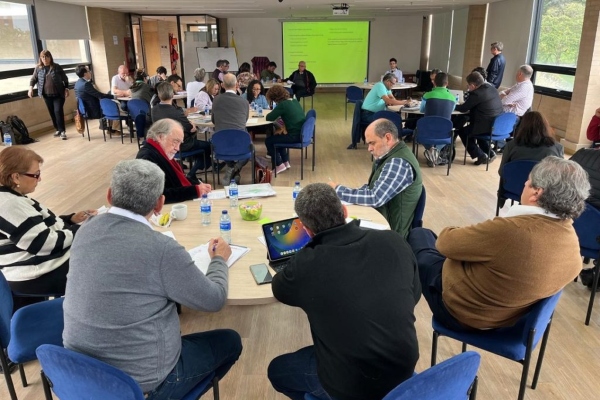ICMC Joins High-Level Dialogue on Work and Care in Latin America and the Caribbean (12 December 2024, Bogota)

Participants engaged in thematic roundtables at the II Fratelli Tutti Synodal Meeting, to foster collaborative approaches to work, care, and a just ecological transition. © CELAM
This article provides an overview of ICMC and the FOWLS project’s participation in the II Fratelli Tutti Meeting organized by the Pontifical Commission for Latin America (PCAL), in conjunction with Latin American Episcopal Council (CELAM) in Bogota. The event was convened to launch a regional platform facilitating cooperation and partnership on work, care, and achieving a just transition.
ICMC Joins High-Level Dialogue on Work and Care in Latin America and the Caribbean
By Rachel Westerby ǀ December 10, 2024
On 11-12 November 2024, ICMC joined forty invited representatives of Church, business, trade union, and academic organizations from Latin America and the Caribbean, at the second Fratelli Tutti Synodal Meeting: socio-environmental roundtable dialogue, held in Bogotá, Colombia.
ICMC was represented by Mr. Ignacio Alonso Alasino, Project Manager of the network of Catholic-inspired organizations around the world, coordinated by ICMC and known as the “The Future of Work – Labour after Laudato si’” (FOWLS) Project.
“We are promoting strong unity in diversity, bringing together leaders from Latin America and the Caribbean at the II Fratelli Tutti Meeting,” he remarked. “This space for intersectoral dialogue seeks to align efforts towards a more just and sustainable future, where ecology and social justice are intertwined in an integral way.”
Organized by the Pontifical Commission for Latin America (PCAL), in conjunction with Latin American Episcopal Council (CELAM), the II Fratelli Tutti Meeting was convened to launch a regional platform facilitating cooperation and partnership on work, care, and achieving a just transition. The initiative envisages socio-environmental dialogue reflected in both collective labor agreements and regional framework agreements that guarantee the dignity of all people.
This regional cooperation process was begun at the first Fratelli Tutti meeting, which took place in Bogotá in March 2023. It responds directly to Pope Francis’ call, in his 2015 encyclical Laudato Sí, for an integrated approach to ensuring “care for our common home”, that encompasses concern for all people and the environment. His approach highlights the central importance of dignified work for social justice, care for the environment, and achieving a just ecological transition.
The process has taken as its core framework the message of 2020’s Fratelli Tutti, the third encyclical of Pope Francis issued in the wake of the global COVID-19 pandemic in which he calls for fraternal action as “a single human family, as fellow travelers sharing the same flesh, as children of the same earth which is our common home, each of us bringing the richness of his or her beliefs and convictions, each of us with his or her own voice.”
Building Cross-Sectoral Dialogue and Cooperation
Alongside ICMC, Church participants at the II Fratelli Tutti Meeting included CELAM, the Ecclesiastical Conference of the Amazon (CEAMA), and the Latin American and Caribbean Ecclesial Network on Migration, Displacement, Refuge and Human Trafficking (CLAMOR), alongside key regional institutional representatives of organized labor in Latin America and the Caribbean, from trades unions, business chambers, employers federations, workers associations and cooperatives, and the International Labor Organization (ILO).
To facilitate cross-regional cooperation and exchange, participants also included representatives of the U.S. Conference of Catholic Bishops (USCCB) and the WSW Industrial Areas Foundation.
The agenda was shaped around eight thematic dialogue rounds, covering the socio-environmental and ecological situation, just transition perspectives from different sectors, the future of work, and sustainable development. Thematic dialogue rounds were conducted via small, cross-sectoral roundtables of six participants, each introduced by a speaker presenting a ‘provocation’ of no more than seven minutes to prompt participant discussion.
Care is Work, Work is Care: Inputs From the FOWLS Project
Mr. Alonso Alasino took the role of speaker for the fifth dialogue round, titled “The Future of Work: Work Activity After the Pandemic”. Reflecting on the interdependent connection between work and the environment, he emphasized that “decent work that respects our environment is key to achieving social and ecological justice, and the foundation of a fair and sustainable economy.”
His intervention drew on the “Care is Work, Work is Care” approach proposed by FOWLS, in which the project’s partners place dignified work at the core of responding to Pope Francis’ call for “care for our common home”. Introducing the approach at the 112th Session of the International Labour Conference (ILC), ICMC President Christine Nathan stated “care is a way of being, doing, and existing, which implies dignity, generosity, freedom, and responsibility, is inspired by a concern for unity in the making, within which work is a transforming activity, and therefore an essential component.”
The II Fratelli Tutti Meeting concluded with an invitation from CELAM to all participating organizations, which together represent more than 60 million workers and businesspeople in the region, to form part of the new Network of Organized Labor of the Americas.
This article was published at the website of the ICMC:

